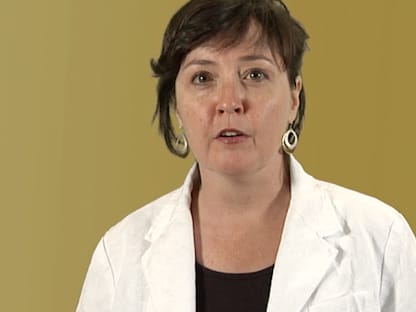Lupus (Systemic Lupus Erythematosus)
Condition Basics
What is lupus (systemic lupus erythematosus)?
Lupus is an autoimmune disease. This means that the body's natural defense system (immune system) attacks your body's healthy tissues instead of attacking only things like bacteria and viruses. This causes inflammation.
Some people with lupus have only mild symptoms. But the disease is lifelong and can become severe. Lupus may cause problems with your skin, kidneys, heart, lungs, nerves, or blood cells.
Systemic lupus erythematosus is the most common and most serious type of lupus. But there are other types of lupus. They include discoid or cutaneous lupus, drug-induced systemic lupus, and neonatal lupus.
What causes it?
The exact cause of lupus isn't known. Experts believe that some people are born with certain genetic mutations that affect their immune systems and make them more likely to get lupus.
What are the symptoms?
Lupus symptoms vary widely, and they come and go. Common symptoms include feeling very tired and having joint pain or swelling (arthritis), a fever, and a skin rash. You may have mouth sores and hair loss. Over time, some people with lupus have problems with the heart, lungs, kidneys, blood cells, or nervous system.
How is it diagnosed?
There is no single test for lupus. Your doctor will check for lupus by examining you, asking you questions about your symptoms and past health, and doing some blood and urine tests. He or she will check for certain criteria to help diagnose lupus. These criteria include the butterfly rash and joint swelling.
How is lupus treated?
Treatment for lupus may include antimalarial medicines to treat fatigue, joint pain, and skin rashes, corticosteroid cream for rashes, and nonsteroidal anti-inflammatory drugs for mild joint or muscle pain and fever. Corticosteroid pills may be prescribed if other medicines don't control your symptoms.
How can you manage it?
One of the goals of controlling mild to moderate lupus symptoms is to prevent flares. You can:
- Get plenty of rest. Some people with lupus need up to 12 hours of sleep every night.
- Avoid the sun. Wear sunscreen and protective clothing when you are outside.
- Exercise regularly to prevent fatigue and joint stiffness.
- Pace yourself. Don't do too many activities.
- Stop smoking.
- Watch your symptoms. If they seem to be getting worse, take steps to control them. For example, if your fatigue, pain, or rash gets worse, it may be a sign of a flare.
- Talk with your doctor about any vaccines you may need.
With good self-care, most people who have lupus can keep doing their regular daily activities.
Help your family and friends understand your limits and needs when your symptoms flare. Build a support system of family, friends, and health professionals.
What Increases Your Risk
The chances of getting lupus are higher in people who:
- Are female.
- Are Black.
- Are ages 15 to 45.
- Have a family history of lupus.
- Take medicines that are linked with drug-induced systemic lupus.
Symptoms
Lupus symptoms vary widely, and they come and go. The times when symptoms get worse are called relapses, or flares. The times when symptoms are under control are called remissions.
Common symptoms include:
- Fatigue. Increased fatigue is a classic sign that a symptom flare is about to happen.
- Joint pain or swelling (arthritis).
- A fever.
- A skin rash. Many people have a butterfly rash over the cheeks and bridge of the nose. Skin sores or flaky red spots may appear on the arms, hands, face, neck, or back.
- Exposure to ultraviolet light (such as sunlight or tanning parlors) typically makes the skin rash worse and can trigger lupus flares.
- Mouth sores.
- Hair loss.
- Raynaud's syndrome. This causes fingers and toes to turn white and blue or red. The skin feels numb, tingly, and cold.
Over time, some people with lupus have problems with the heart, lungs, kidneys, skin, blood cells, or nervous system.
What Happens
The course of lupus varies by individual. It's hard to predict because symptoms come and go. You may not notice the symptoms for a long time. But sometimes lupus develops rapidly.
The times when you have symptoms are called flares or relapses. Remissions are times when your symptoms are under control. Flares and remissions can occur abruptly and without clear cause. There is no way to predict how bad a flare will be or how long it will last. During a flare, you may have new symptoms plus those you have had in the past.
Children can get lupus. But it usually develops in the teen years or later. When vital organs are involved, lupus in children appears to be more severe than in adults.
There are also concerns if you have lupus and are pregnant. Some people with lupus have kidney and heart problems. But most people live a normal or near-normal lifespan.
Things that trigger lupus flares
Certain things can trigger lupus flares. These may include:
- Exposure to ultraviolet light. This is usually from sunlight.
- Smoking. Smoking can trigger flares and may also make them more severe.
- Some medicines.
- Some infections. Some people who have cytomegalovirus (CMV), parvovirus (such as fifth disease), and hepatitis C infections eventually get lupus. The Epstein-Barr virus has been linked to lupus in children.
- Chemical exposure. Suspected chemical toxins include trichloroethylene in well water and silica dust. Hair dyes and straighteners, linked to lupus in the past, are no longer thought to trigger it.
Learn more
When to Call a Doctor
Call 911 or other emergency services immediately if you have symptoms of a heart attack. These may include:
- Chest pain or pressure, or a strange feeling in the chest.
- Sweating.
- Shortness of breath.
- Nausea or vomiting.
- Pain, pressure, or a strange feeling in the back, neck, jaw, or upper belly, or one or both shoulders or arms.
- Lightheadedness or sudden weakness.
- A fast or irregular heartbeat.
After you call 911, the operator may tell you to chew 1 adult-strength or 2 to 4 low-dose aspirin. Wait for an ambulance. Do not try to drive yourself.
Call 911 or other emergency services immediately if you have one or more of the following signs of a stroke. Symptoms of a stroke happen quickly. A stroke may cause:
- Sudden numbness, tingling, or weakness or loss of movement in your face, arm, or leg, especially on only one side of your body.
- Sudden vision changes.
- Sudden trouble speaking.
- Sudden confusion or trouble understanding simple statements.
- Sudden problems with walking or balance.
- A sudden, severe headache that is different from past headaches.
Call a doctor now if you:
- Are short of breath.
- Have blood in your urine or are urinating less often and in smaller amounts than usual.
- Have a fever with or without a headache and body aches, but you haven't recently been exposed to a cold or the flu.
- Have depression or any changes in behavior or thinking.
- Have numbness or tingling in the hands or feet.
- Are dizzy or have muscle weakness.
- Have swelling of the lower legs or feet.
Call a doctor as soon as possible if you develop any new symptoms of lupus. Also call your doctor if any symptoms that you've had for a period of time get worse.
If you have not been diagnosed with lupus and you have symptoms such as joint pain, fatigue, or skin rashes, see your doctor or tell your doctor about your concerns at your next medical appointment.
Who to see
To evaluate initial symptoms and treat mild lupus, you can talk with:
- A family medicine physician or an internist.
- A rheumatologist.
- An immunologist.
For long-term management of complicated lupus, talk with:
- A rheumatologist.
- An immunologist.
For more complicated cases of lupus, a rheumatologist is usually the primary doctor. Other specialists are consulted as needed.
- For mental health problems such as depression, anxiety, psychosis, or other behavioral changes, see your family medical doctor or internist, or a psychiatrist.
- For the treatment of organ problems, a doctor who specializes in diseases of that particular organ system may work together with a rheumatologist or immunologist. The following practitioners typically treat vital organ problems caused by lupus:
Exams and Tests
There is no single test for lupus. Because lupus affects different people in different ways, it can be hard to diagnose. It can take time for symptoms to develop. And sometimes it takes weeks to years to diagnose.
Your doctor will give you an exam and ask questions about your symptoms and past health. He or she will check for certain criteria to help diagnose lupus. These include a butterfly rash, joint swelling, fatigue, being sensitive to sunlight, and mouth or nose sores.
If you have lupus symptoms and you have a positive antinuclear antibody test result, you may not need more testing.
If your doctor feels that you do need more tests, you may have one or more of these tests:
- Other antibody blood tests
- Complement test
- Erythrocyte sedimentation rate or C-reactive protein
- Complete blood count
- Urinalysis
- Lupus anticoagulant test
Learn more
Treatment Overview
Lupus treatment can be complicated. Symptoms vary, and flares and remissions can still happen. But the goal of treatment is to find a balance between controlling your symptoms, preventing organ damage, and having fewer side effects.
Treatment for mild lupus may include:
- Antimalarial medicines. They can treat fatigue, joint and muscle pain, and skin rashes.
- Corticosteroid cream for rashes.
- Nonsteroidal anti-inflammatory drugs (NSAIDs). These can treat mild joint or muscle pain and fever.
- Corticosteroid pills. They're used if other medicines don't control your symptoms.
If your lupus causes or threatens organ damage, is life-threatening, or has a serious impact on your quality of life, you may also need to take:
- Corticosteroids in higher doses. These may be in pills or through a vein in your arm (I.V.).
- Medicine that suppresses your immune system (immunosuppressants).
Some people get serious kidney disease that can't be controlled with medicine. They may need dialysis or a kidney transplant.
Learn more
Self-Care
Reduce stress and tiredness
- Keep your daily schedule as simple as possible.
- Keep your list of things to do as short as you can.
- Exercise regularly. A daily walk or swim, for example, can lower stress, clear your head, improve your mood, and help fight tiredness.
- Use meditation, yoga, or guided imagery to relax.
- Get plenty of rest. Some people with lupus need up to 12 hours of sleep every night.
- Pace yourself. Do not do too many activities.
- Ask others for help. Do not try to do everything yourself.
- Take short breaks from your usual activities. Think about cutting down on work hours when your symptoms are severe.
- If you think that depression or anxiety is making you feel more tired, talk to your doctor, a mental health professional, or both.
Take care of your skin
- Ask your doctor about the use of corticosteroid creams for skin symptoms.
- If you are bothered by the way a lupus rash looks on your face or if you have scars from lupus, you can try makeup, such as Covermark, to cover the rash or scars.
- Stay out of the sun, especially when the sun's rays are the strongest, usually between 10 a.m. and 4 p.m. If you must be in the sun, cover your arms and legs, and wear a hat. Make sure to use a broad-spectrum sunscreen that has a sun protection factor (SPF) of 50 or higher. Put more sunscreen on after swimming, sweating, or toweling off.
Practice good self-care
- Learn more about lupus and how to take care of yourself.
- Take your medicines exactly as prescribed. Call your doctor if you have any problems with your medicine.
- Do not smoke. If you need help quitting, talk to your doctor about stop-smoking programs and medicines. These can increase your chances of quitting for good.
- Eat a healthy, balanced diet. A balanced diet includes whole grains, dairy, fruits and vegetables, and protein. Eat a variety of foods from each of those groups so you get all the nutrients you need.
- Avoid infections such as COVID-19, colds, and the flu. Talk with your doctor about any vaccines you may need, including COVID-19, flu, and pneumococcal vaccines. If you do get sick or think you are getting an infection, talk with your doctor so you can treat your symptoms right away.
- Brush and floss your teeth each day. See your dentist two times a year.
- Get regular eye exams.
- Build a support system of family, friends, and health professionals.
Learn more
Watch
Credits
Current as of: July 31, 2024
Author: Ignite Healthwise, LLC Staff
Clinical Review Board
All Ignite Healthwise, LLC education is reviewed by a team that includes physicians, nurses, advanced practitioners, registered dieticians, and other healthcare professionals.
Current as of: July 31, 2024
Author: Ignite Healthwise, LLC Staff
Clinical Review Board
All Ignite Healthwise, LLC education is reviewed by a team that includes physicians, nurses, advanced practitioners, registered dieticians, and other healthcare professionals.







